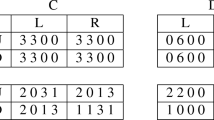Abstract
Supergames are repeated games in which a fixed known finite one-shot game is repeated over and over. Information about the actions chosen at each stage is provided by a signalling technology. This paper studies the main properties that are valid over this whole class of games and both surveys known results and provides new ones.
Similar content being viewed by others
References
Abreu D, Pearce D, Stacchetti E (1990) Toward a theory of discounted repeated games with imperfect monitoring. Econometrica 58:1041–1063
Aubin JP (1977) Applied abstract analysis. Wiley, New York
Aumann RJ (1974) Subjectivity and correlation in randomized strategies. J Math Econ 1:67–96
Aumann RJ, Maschler M (1995) Repeated games with incomplete information, with the collaboration of R. Stearns. MIT Press, Cambridge
Aumann RJ, Shapley LS (1994) Long-term competition—a game theoretic analysis. In: Megiddo N (ed) Essays on game theory. Springer, New York, pp 1–15
Ben-Porath E, Kahneman M (1996) Communication in repeated games with private monitoring. J Econ Theory 70:281–297
Benoit J-P, Krishna V (1985) Finitely repeated games. Econometrica 53:905–922
Benoit J-P, Krishna V (1987) Nash equilibria of finitely repeated games. Int J Game Theory 16:197–204
Ely J, Hörner J, Olszewski W (2005) Belief-free equilibria in repeated games. Econometrica 73:377–415
Forges F (1986) An approach to communication equilibria. Econometrica 54:1375–1385
Forges F, Mertens J-F, Neyman A (1986) A counterexample to the Folk theorem with discounting. Econ Lett 20:7–7
Fudenberg D, Levine D (1991) An approximate Folk theorem with imperfect private information. J Econ Theory 54:26–47
Fudenberg D, Levine D (1994) Efficiency and observability with long-run and short-run players. J Econ Theory 62:103–135
Fudenberg D, Maskin E (1986) The Folk theorem in repeated games with discounting or with incomplete information. Econometrica 54:533–554
Fudenberg D, Levine D, Maskin E (1994) The folk theorem with imperfect public information. Econometrica 62:997–1039
Fudenberg D, Levine D, Takahashi S (2007) Perfect public equilibrium when players are patient. Games Econ Behav 61:27–49
Gossner O (1995) The Folk theorem for finitely repeated games with mixed strategies. Int J Game Theory 24:95–107
Gossner O, Tomala T (2007) Secret correlation in repeated games with imperfect monitoring. Math Oper Res 32:413–424
Hillas J, Liu M (1996) Repeated games with partial monitoring: the stochastic signaling case. Game Theory and Information 9605001, EconWPA
Kandori M, Matsushima H (1998) Private observation, communication and collusion. Econometrica 66:627–652
Kohlberg E (1975) Optimal strategies in repeated games with incomplete information. Int J Game Theory 4:7–24
Kuhn HW (1953) Extensive games and the problem of information. In: Kuhn, Tucker (eds) Contributions to the theory of games. Annals of Mathematical Studies 28, vol II. Princeton University Press, Princeton, pp 193–216
Lehrer E (1989) Lower equilibrium payoffs in two-player repeated Games with non-observable actions. Int J Game Theory 18:57–89
Lehrer E (1990) Nash equilibria of n-player repeated games with semi-standard information. Int J Game Theory 19:191–217
Lehrer E (1992) Correlated equilibria in two-player repeated games with non-observable actions. Math Oper Res 17:175–199
Lehrer E (1992) On the equilibrium payoffs set of two-player repeated games with imperfect monitoring. Int J Game Theory 20:211–226
Lehrer E (1992) Two-player repeated games with nonobservable actions and observable payoffs. Math Oper Res 17:200–224
Lippman S (1969) Criterion equivalence in discrete dynamic programming. Oper Res 17:920–923
Mailath G, Samuelson L (2006) Repeated games and reputations: long-run relationships. Oxford University Press, Oxford
Mailath G, Matthews S, Sekiguchi T (2002) Private strategies in finitely repeated games with imperfect public monitoring. Contrib Theor Econ 2, article 2
Mertens J-F, Sorin S, Zamir S (1994) Repeated games. CORE discussion paper 9420, Louvain-la-Neuve
Moulin H, Vial J-P (1978) Strategically zero-sum games: the class of games whose completely mixed equilibria cannot be improved upon. Int J Game Theory 7(3/4):201–221
Myerson R (1986) Multistage games with communication. Econometrica 54:323–358
Renault J (2000) 2-player repeated games with lack of information on one side and state independent signalling. Math Oper Res 25:552–572
Renault J, Tomala T (1998) Repeated proximity games. Int J Game Theory 2:539–559
Renault J, Tomala T (2004) Communication equilibria in supergames. Games Econ Behav 49:313–344
Renault J, Scarlatti S, Scarsini M (2005) A Folk theorem for minority games. Games Econ Behav 53:208–230
Renault J, Scarlatti S, Scarsini M (2008) Discounted and finitely repeated minority games with public signals. Math Soc Sci 56:44–74
Rubinstein A (1977) Equilibrium in supergames. Center for Research in Mathematical Economics and Game Theory, Research Memorandum 25
Sekiguchi T (2001) A negative result in finitely repeated games with product structure. Econ Lett 74:67–70
Sekiguchi T (2005) Uniqueness of equilibrium payoffs in finitely repeated games with imperfect monitoring. Jpn Econ Rev 56:317–331
Shapley LS (1953) Stochastic games. Proc Natl Acad Sci USA 39:1095–1100
Sorin S (1986) On repeated games with complete information. Math Oper Res 11:147–160
Sorin S (1992) Repeated games with complete information. In: Aumann RJ, Hart S (eds) Handbook of game theory with economic applications. Elsevier, Amsterdam, pp 71–107
Tomala T (1998) Pure equilibria of repeated games with public observation. Int J Game Theory 27(1):93–109
Tomala T (1999) Nash equilibria of repeated games with observable payoff vector. Games Econ Behav 28:310–324
Author information
Authors and Affiliations
Corresponding author
Rights and permissions
About this article
Cite this article
Renault, J., Tomala, T. General Properties of Long-Run Supergames. Dyn Games Appl 1, 319–350 (2011). https://doi.org/10.1007/s13235-011-0018-3
Published:
Issue Date:
DOI: https://doi.org/10.1007/s13235-011-0018-3




